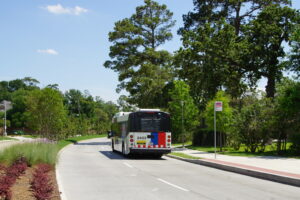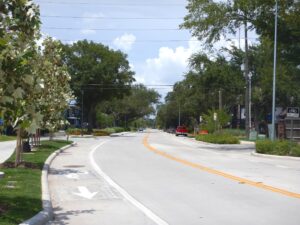The West Houston Association is proud to announce the first two projects being acknowledged through our Mobility Recognition Program.
The Mobility Recognition Program started this year as an initiative of the WHA Regional Mobility Committee to recognize essential and influential transportation projects that benefit the greater West Houston region and beyond. The program acknowledges projects that provide impactful and holistic societal benefits, specifically in the key areas of safety, connectivity, resiliency, economic development, innovation, and community impacts, and how well project integrate throughout the region’s multimodal mobility landscape.

Memorial Drive
Celebrating and promoting mobility improvements serves as a catalyst for ongoing advocacy, funding, development, and execution of exemplary projects. By recognizing successful endeavors, decision-makers at various levels within the public and private sectors are encouraged to prioritize and continue supporting similar initiatives. Recognition of these successful projects creates positive feedback, fostering a culture that values and prioritizes transportation projects and promotes sustained commitment and investment in the region’s mobility infrastructure.
To be eligible for recognition, capital projects, plans, or initiatives must enhance mobility in innovative and impactful ways. The West Houston Association (WHA) seeks projects that embrace diverse approaches, including surface transportation, public transit, bicycle and pedestrian pathways, intelligent transportation systems, mobility management solutions, and freight or regional goods mobility.
This year, two projects were selected for recognition: Memorial City’s Memorial Drive Reconstruction project and the Westchase District’s Walnut Bend Lane Reconstruction have both improved the quality of life for West Houston residents.

Walnut Bend Lane
The Memorial Drive Project, from Beltway 8 to Tallowood Road deserves praise for its improvements to multimodal mobility, safety, access, and drainage, and for incorporating community comments throughout the planning process. This project improved the flow of automotive, transit, and pedestrian traffic along the corridor, and incorporated modern safety enhancements for the betterment of the community. Traffic signal upgrades not only reduced traffic congestion at intersections, but the new mast-arm configurations also helped to improve windstorm resiliency of the structures. The project team coordinated with the community through the planning and design process to incorporate drainage improvements to mitigate stormwater events. Furthermore, the project improved sustainability by encouraging the use of alternative transportation modes such as the METRO bus system along the corridor by including pedestrian lighting and 8-foot-wide paths. The project accomplished its goals while maintaining property access along the route and facilitating the flow of regional goods movement in the Beltway 8 and I-10 area.
The Walnut Bend Lane Reconstruction project is equally meritorious for its improvements to area walkability, multimodal circulation, safety, aesthetics, and sustainability. Along its 1.1-mile length between Westpark and Westheimer, this major collector street project involved roadway reconstruction, replacement and upgrades of underground utilities such as storm, water and sewer, new bike lanes, and back of curb improvements such as functional landscaping, pedestrian lighting, and upgraded bus stops. Walnut Bend utilized context sensitive design treatments such as wayfinding signage, improved crosswalk markings, 6-foot-wide sidewalks, bike lanes, seat walls, tactile paving, and an increased tree canopy to improve the corridor. The project helped to create an area identity and character, while creating a true ‘complete street.’ The project’s use of bike lanes and connectivity to area trails improved non-automotive transportation choices for residents. In addition, the project ensured that heavy trucks and vehicles were accommodated with improved turning radii at key locations along the corridor. Walnut Bend’s successful project has increased area property values, improved multifamily occupancy rates, and enhanced overall community well-being.
Both the Memorial Drive and Walnut Bend projects demonstrate an excellent use of complex financing sources and the successful integration of numerous stakeholders into the long-term maintenance. Each project has successfully met the goals of the WHA Mobility Recognition Program and will be formally recognized at the WHA Public Officials and Awards Reception on October 9th, 2024, being held at the Junior League of Houston.
